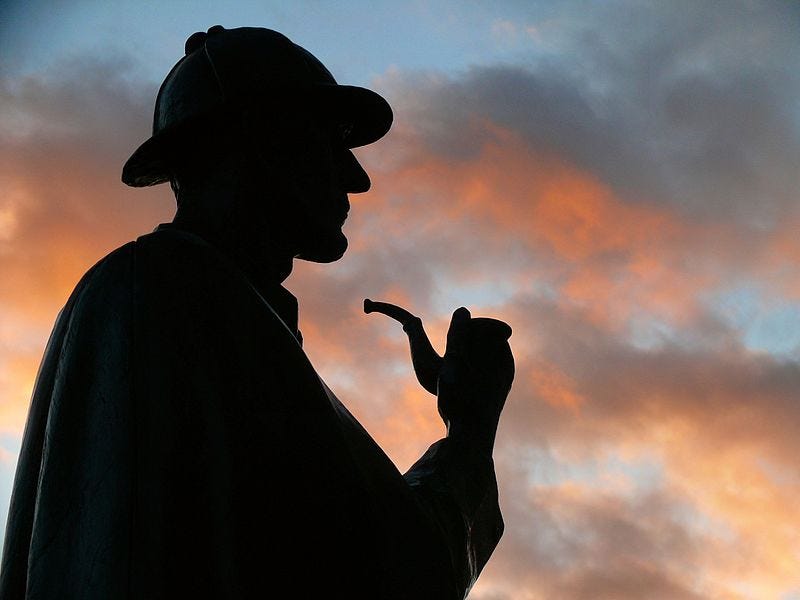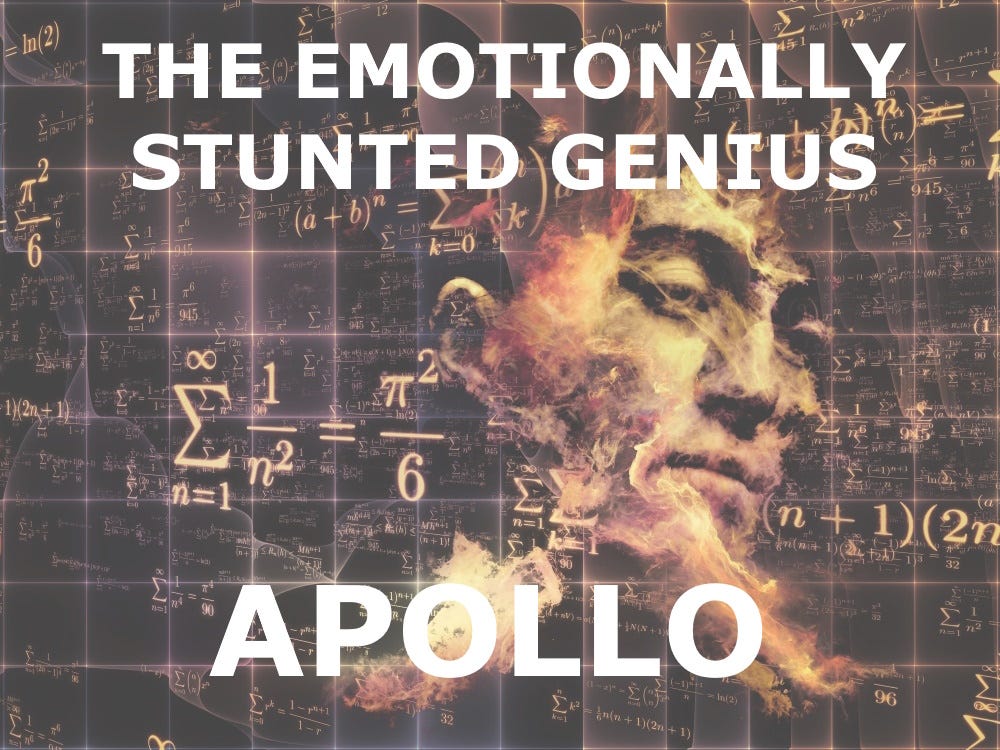This is my second post about Apollo character archetypes.
(But not my second post ever about Apollo. Here’s one about Golden Son characters, and here’s one that’s an overview of the archetype.)
Spoilers for Sherlock and The Social Network.
*
A few of Apollo’s main characteristics are that he’s highly intellectual and has the emotional sense of a glob of yogurt.
He’s known for rationality and logic. He doesn’t understand passion, and may shun feelings altogether. It’s safe to say that relationships aren’t his thing. Don’t expect him to go out of his way to provide for your emotional needs. Or even say something nice to you.
Because of this, Apollo feels like he’s better than everyone around him.
He’s also often lonely. Apollo characters like to live in some kind of tower where they don’t have to interact with weird, erratic, illogical folks—who they have trouble connecting with, anyway.
Hence that “Far-Distant” moniker.
Because he’s smarter and better than everyone and lives in his own little world, he can get . . . eccentric.
He’s also known for having some kind of addiction or bad habit. He has a whole collection of excuses for this. Usually, it’s that his substance of choice helps him deal with stress, or keep his mind in an optimized, elevated state so he can do his all-important work. He disregards other people’s concerns for him, because they don’t understand him anyway. They’re the rabble.
At his best, this version of Apollo solves world problems, invents new technologies, chases the most elusive bad guys, and elevates humanity.
At his worst, he’s a sociopathic megalomaniac who kills people or tries to take over the world (Lex Luthor style).
So let’s take a look at a few of these characters.
Sherlock Holmes
We all know Sherlock from one source or another—whether it’s the page, or one of his various incarnations on the screen.
A few things are consistent with the character regardless of where he shows up. (Assuming the adaptation stays relatively true to Arthur Conan Doyle.)
First of all, he’s absolutely over-the-top brilliant. He’s always ten steps ahead of everyone else, and he’s not quiet about it. He’s arrogant about his intellect and likes to show it off.
Everybody puts up with it because he always catches the bad guy.
He often goes about this in eccentric ways, though.
In one of Arthur Conan Doyle’s stories, Holmes pretends he’s gravely ill for days, making everyone including his flatmate and (ahem) best friend Watson think he’s on the brink of death. This is all to trap the bad guy, of course. In another, he locks himself up in a room in the flat at 221B Baker St., and refuses to come out for days. Dr. Watson would usually take all the weird noises emanating from the room in stride, but this time Holmes orders Watson to also not leave the flat, and this slowly begins to drive Watson crazy. Holmes refuses to provide any explanation for either the lockup or the noises.
In various stories, Holmes disguises himself as a sailor, an asthmatic mariner, a hunch-backed old book collector, a priest, a plumber, an unemployed blue-collar worker, an elderly woman, and more.
He stays awake for days and then collapses into long stretches of sleep.
He forgets to eat or intentionally fasts for days on end when he’s working on a case.
He regularly insults the intelligence of the police force. To their faces.
He stores body parts so he can study them.

Perhaps it’s not surprising that such a man has his demons.
For example, he’s famously addicted to smoking and cocaine (which he takes in a 7% solution, despite Watson’s loud misgivings).
He has trouble with personal relationships. Sherlock Holmes has no girlfriends, and can even be misogynistic.
Here are a few quotes from Doyle:
“All emotions, and that one particularly, were abhorrent to his cold, precise, but admirably balanced mind. He was, I take it, the most perfect reasoning and observing machine that the world has seen: but, as a lover, he would have placed himself in a false position.” (A Scandal in Bohemia)
“He thought that love is an emotional thing, and whatever is emotional is opposed to his true, cold reason which he placed above all things. He should never marry himself, lest it bias his judgment.” (The Sign of Four)
Holmes’s only friend is Watson, and he is seriously lucky that Watson puts up with all his shit. He also trusts his brother Mycroft, to an extent.
Overall, he’s about as emotional as a spaghetti squash.
He fails miserably at comforting the victims of the crimes he’s investigating (when he bothers to try at all). He’s often rude to people—even Watson. While he’s faking his near-death and Watson expresses concern, Holmes snaps at him to “Do what I tell you, and you may leave me alone!”
Geez. Sorry for caring, dude.
Sherlock Holmes is a fun character to adapt, so we’ve gotten multiple renditions of him on the screen. Here he is both winning and failing in epic fashion, in the BBC’s series (where he’s played by Benedict Cumberbatch). We get to see his genius, eccentricity, addiction, rudeness, and emotional stupidity all in one excellent scene.:
The Emotionally Stunted Genius can go dark, of course.
*
Emotionally Stunted Evil Genius
I could have featured a lot of characters here.
But I chose Zuck from The Social Network (aka Evil Sheldon Cooper).
In the movie, Mark Zuckerberg is a a student at Harvard University. He’s brilliant, especially when it comes to computers and the internet, which—back in 2003—was still in early stages of development.
From the very beginning of the film, Mark uses his powers for evil.
After his girlfriend breaks up with him, he hacks into various websites to steal the personal info of his fellow students, creates a website that rates female undergrads against one another, and insults his ex-girlfriend online. Multiple times. Reputations and social lives are devastated.
It’s a great character intro.
Right away we see that he’s brilliant, egotistical, ambitious, bad with people, and ruthless.
Mark steals the idea for Facebook from a few fellow Harvard students.
Then he grows Facebook into a bigger company with a few friends and a shallow social schmoozer Justin Timberlake. But when push comes to shove, Mark pushes and shoves his best friend out of the picture.
And okay, I get that poor Zuck isn’t actually evil in this movie.
Towards the end, he does show humanity. Like when he doesn’t want his best friend to fall quite so hard as he does. And when he clicks refresh on his ex-girlfriend’s profile repeatedly, waiting to see if she accepted his friend request. And when one of the attorneys working to settle the lawsuits against him (for stealing Facebook) says, “You’re not an asshole, Mark. You’re just trying so hard to be.”
But through much of the film, his m.o. is egomania, condescension, and betrayal.
Here’s the opening scene to The Social Network:
*
So those are a few light and dark versions of this archetype. Of course, there are sooo many others I didn’t touch on. Like Spock and Data (Star Trek), Sheldon Cooper (The Big Bang Theory), Hannibal Lecter (Hannibal, etc.), and Lex Luthor.
Drop a comment and let me know if I left out your favorite stupid genius Apollo character. :-)



